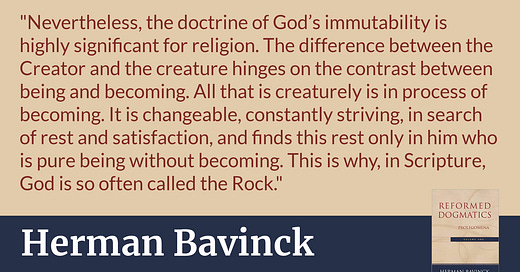God's Immutability
“Of old you laid the foundation of the earth, and the heavens are the work of your hands. They will perish, but you will remain; they will all wear out like a garment. You will change them like a robe, and they will pass away, but you are the same, and your years have no end.” (Psalm 102:25–27, ESV)
“For I the LORD do not change; therefore you, O children of Jacob, are not consumed.” (Malachi 3:6, ESV)
What Does That Mean?
We don’t use the word “immutable” often (if ever). So, when we say that God is “immutable”, we need to do some explaining. According to the dictionary, the word “mutable” means “liable to change.” When you add the prefix “im-” it means “NOT liable to change.” That means, rather than saying God is immutable, we could simply say God is unchangeable.
Throughout Scripture
We see this attribute of God throughout all of Scripture. Look at the two verses at the beginning of this post. Psalm 102 talks about how creation is always changing and always passing away, but God is “the same, and [his] years have no end” (Psalm 102:27, ESV). God is neither changing nor passing away. He is unchanging and eternal.
The Lord himself says this explicitly in the book of Malachi: “I the LORD do not change…” (Malachi 3:6, ESV). You can’t argue with that passage. It’s clear and to the point. God does not change.
Creator/Creature Divide
Remember, these first attributes are “Incommunicable Attributes”—attributes not shared with humans. Therefore, each of the attributes emphasize the Creator/creature divide.
For this attribute, the nature of a creature is that of “becoming.” As Psalm 102 says, we are always changing, always becoming. We are growing up and growing old. Yet, the nature of the ultimate Creator is not one of “becoming” but “being.” Remember the name YHWH means, “I am.” Since God IS—and is not becoming—points to the fact that God is unchanging. He is the same yesterday, today, and forever (Hebrews 13:8).
Are You Sure?
At some point in this conversation, someone always asks, “Are you sure God is unchangeable? It seems there are times in the Bible when God changes his mind.” They often turn to Exodus 32 where it says, “And the LORD relented from the disaster that he had spoken of bringing on his people.” (Exodus 32:14, ESV) or to Jonah where it says, “When God saw what they did, how they turned from their evil way, God relented of the disaster that he had said he would do to them, and he did not do it.” (Jonah 3:10, ESV). These are important verses to consider.
Yet, we must understand the Bible as a whole. We should not take bits and pieces of the Bible and “pit them against” each other. As I’ve already shown, the Bible clearly teaches that God is unchangeable. Yet, we have these passages that seem to show God changing his mind. How do we reconcile these things?
God’s Baby Talk
John Calvin famously said that in Scripture “God…lisps with us as nurses are wont to do with little children” (Institutes, 1.13.1). That means when God is speaking to us through Scripture, he is talking baby talk to us. Otherwise, we wouldn’t be able to understand anything He says. So, he has to accommodate his language so we can understand.
This helps us reconcile the two issues. God may seem to change his mind at certain points of scripture, however, when understood in light of the rest of God’s Word, this is accommodation for human experience. Louis Berkhof says, “[God] is also said to repent, but this is evidently only a human way of speaking of God…and really indicates a change in man’s relation to God” (Summary of Christian Doctrine, p. 34–35). Along similar lines, Herman Bavinck says, “There is change around, about, and outside of him, and there is change in people’s relations to him, but there is no change in God himself” (Reformed Dogmatics, p. 158).
Why This Is Important
This attribute of God is EXTREMELY important. If you believe God can change, He is no longer God. Herman Bavinck says, “If God were not immutable, he would not be God…All that changes ceases to be what it was.” (Reformed Dogmatics, p. 154). A changing God is no God at all.
Also, God’s immutability provides a foundation upon which we can place our faith and find comfort. Can you imagine if God changed? If he was merciful one day and not the next? If he was trustworthy one day and not the next? We could not put our faith and trust in a god like this. We could find no comfort in a god like this.
Yet, our God is “forever the same in His divine Being and perfections, and also in His purposes and promises” (Louis Berkhof, Summary of Christian Doctrine, p. 34).
His character never changes. His is always the same yesterday, today, and forever. This makes Him reliable and trustworthy.
His promises are unchanging. When he promises something, we never have to worry about that promise changing. He keeps his word and fulfills His promises. He is faithful.
And, finally, His purposes are unchanging. His mission is not changing every other week. He is working all things together for the good of those who love Him (Romans 8:28) and working all things together for His glory (Ephesians 1:12, 14).



